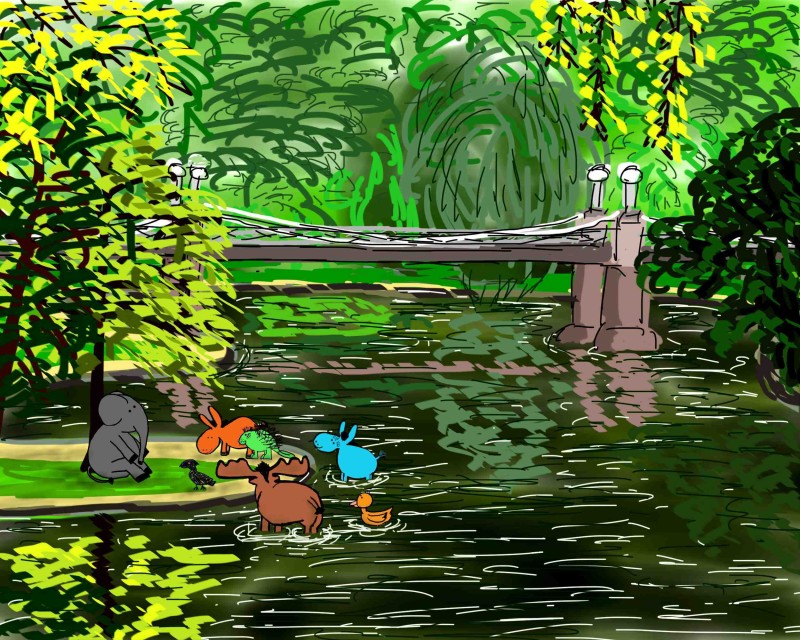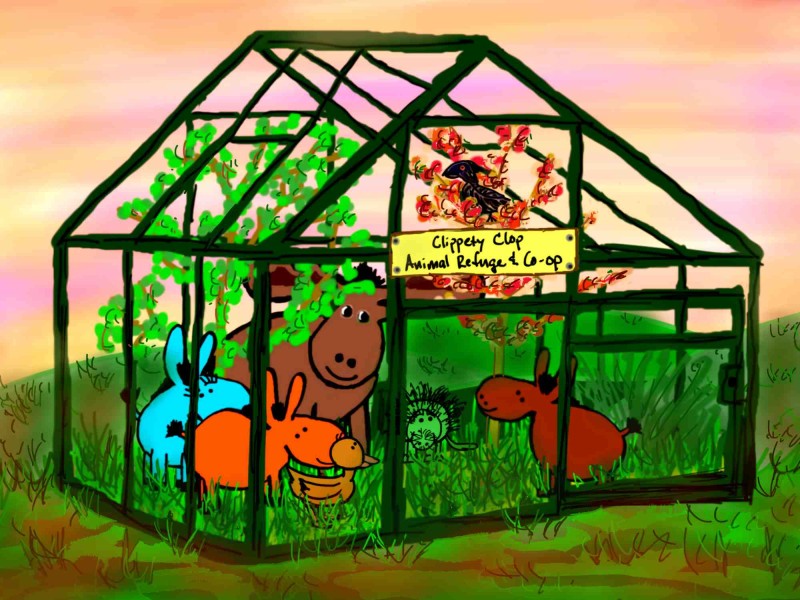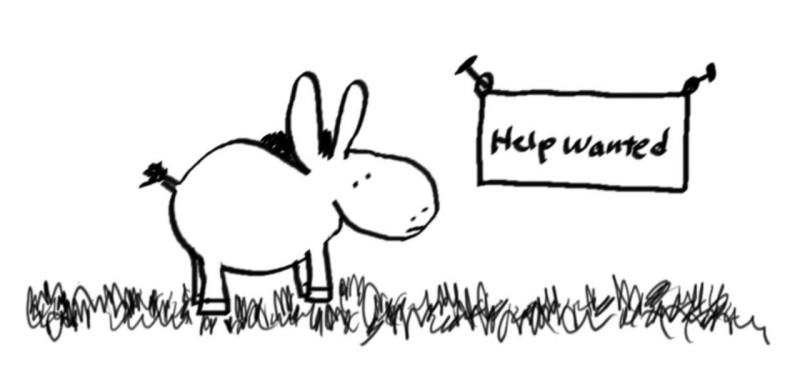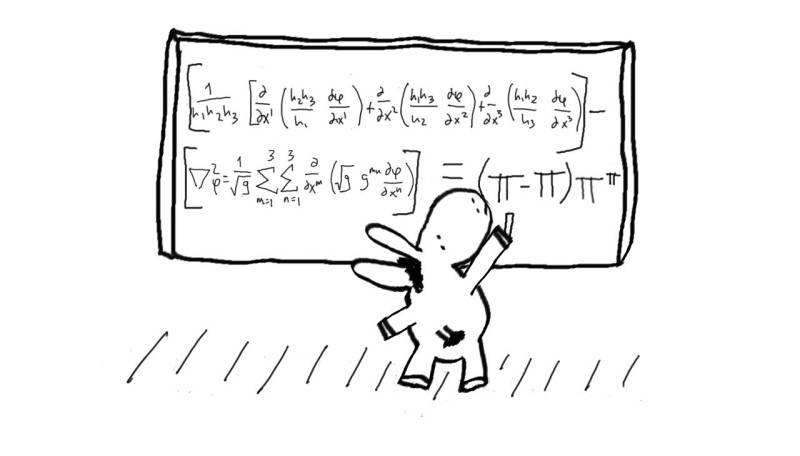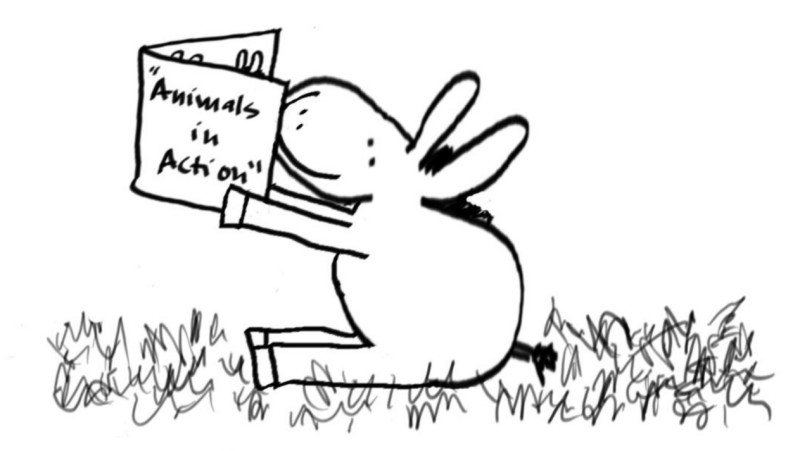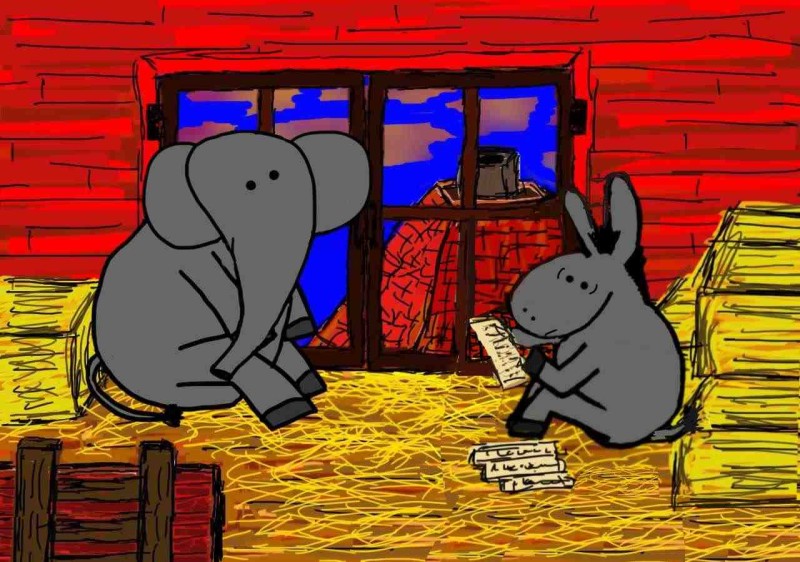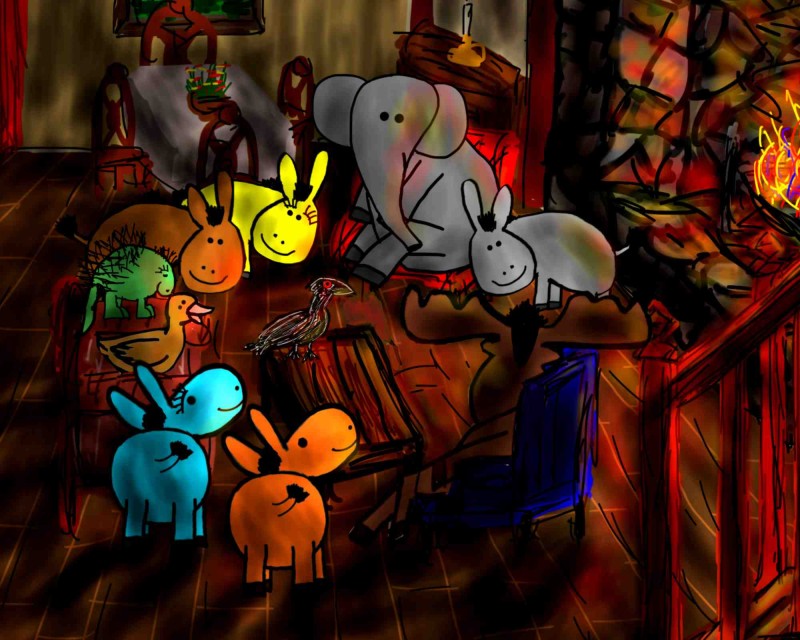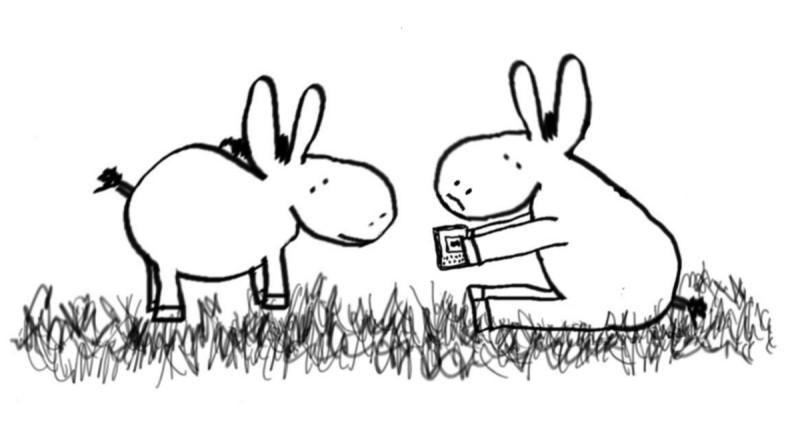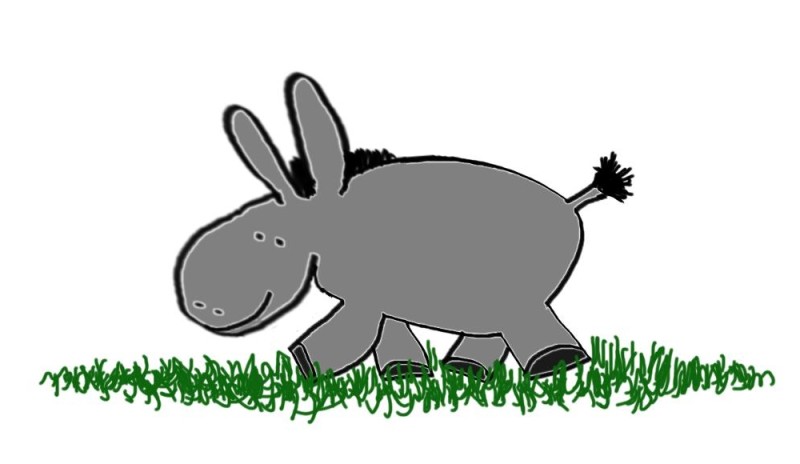Welcome, said Harlan, to “Where-101.” Today’s question is: “Where is Borneo?”
What is Borneo? said Morton.
No, said Harlan, “Where is Borneo?”
In Asia, said Glouster.
What’s he doing in Asia? said Morton.
Borneo isn’t a he, said Glouster, it’s an it.
An it? said Morton.
Yes, said Glouster, an island north of Java.
I like a cup of Java in the morning, said Frank, sometimes two.
Java is an island, said Glouster.
How do you know so much? said Chelsea.
North Borneo, said Glouster, was a protectorate of the British Empire from 1881 to 1941, and a Crown Colony from 1946 to 1963.
Do they speak English in Borneo? said Emma Lou.
The official language is Bahasa Melayu, said Glouster, but English is common, as well as the indigenous languages, Oma Lung and Uma Kulit.
Is Asia far from Boston? said Chelsea.
It’s on the other side of the world, said Glouster.
How far is that? said Chelsea.
Nine thousand two hundred and fifty-two miles, said Glouster.
Wow, said Chelsea, that would take forever!
How fast can you walk? Morton.
Four miles per hour, said Chelsea.
Really? said Morton. I only walk three.
I can fly thirty miles per hour, said Frank.
I wish I could fly, said Chelsea.
I can only walk one mile per hour, said Emma Lou.
I can fly more than forty miles per hour, said Glouster, and swim almost twice as fast.
Wow, said Chelsea, like the speed of light!
Not that fast, said Emma Lou.
Why would anyone live in Borneo, said Morton, if it’s so far from Boston?
Why would anyone live in Boston, said Emma Lou, if it’s so far from Borneo?
What does it feel like to fly? said Chelsea.
It’s like swimming, said Glouster, but in the air.
What does it feel like to swim? said Chelsea.
It’s like flying, said Glouster, but in water.
I don’t swim very fast, said Emma Lou, but I float.
Really? said Chelsea. Without sinking?
Yes, said Emma Lou.
Wow, said Chelsea.
Are there donkeys in Borneo? said Morton.
A few, said Glouster, but there are more elephants.
How many more? said Morton.
Fewer than there were, said Glouster, before their habitat was destroyed.
Is that why you left Borneo? said Emma Lou.
Yes, said Harlan.
That’s very sad, said Chelsea.
Does your family still live there? said Emma Lou.
My brothers, said Harlan, were killed for their tusks.
What?! said Chelsea.
And I don’t know, said Harlan, where my parents are.
I think, said Chelsea, that I’m going to cry.
I’m glad I don’t live in Borneo, said Morton.
It’s a very beautiful place, said Harlan, despite the problems.
Where are your tusks? asked Emma Lou.
I had them removed, said Harlan, so no one would kill me.
Is Asia near India? said Chelsea.
India is in Asia, said Harlan.
Really? said Chelsea. Have you read the Mahabharata?
Yes, said Harlan.
Are you a Hindu? said Emma Lou.
Yes, said Harlan.
Do you believe in reincarnation? said Emma Lou.
Yes, said Harlan.
In the Mahabharata, said Chelsea, the god Krishna tells Arjuna all about reincarnation and selfless service.
That part of the novel, said Harlan, is called the “Bhagavad Gita.”
I think there’s an inherent contradiction in the concept of reincarnation and the concept of Atman, said Emma Lou.
A contradiction? said Harlan.
Yes, said Emma Lou. As I understand it, Atman is the universal Brahman as manifested in the individual. Atman is beyond duality—beyond time and space, beyond good and evil, and beyond ego. And being beyond ego it is beyond individuality; it is the undifferentiated “one” that underlies all things. The concept of karma and reincarnation, on the other hand, says that when a person dies the soul returns to become Atman (the undifferentiated “one”), yet this soul somehow retains the karma (unresolved issues) of the individual when that person was living. This soul, with its unresolved issues, must then be reincarnated in the world in order to work through those issues. My question is this: How can the soul, after the death of the individual, become ego-less Atman and yet hang on to the issues of the ego-individual? If the soul becomes “ego-less” after death, it cannot hang on to the unresolved issues of a former ego. Atman and Brahman, by definition, are beyond maya and unresolved issues.
That’s a good question, said Harlan.
What’s the answer? said Emma Lou.
The doctrine of reincarnation, said Harlan, belongs to the apara vidya—or “lower knowledge”—that operates in the world of “maya” or illusion. The Para Vidya—or “Higher Knowledge”—removes the illusion of the manifold world and, with it, the illusion of the individual soul and its birth, death and hereafter. The function of organized religion is twofold. On one hand it teaches the secrets of wonder and mystery, and on the other it is a rule book for a functioning society. For those with Para Vidya, those who can truly understand the “oneness” of all things, there is no need for the concept of reincarnation, because there are no unresolved issues in “oneness.” For those who cannot embrace or “experience” the mystical union that is beyond individual objects, karma and reincarnation play a civilizing role. They inspire members of society to perform “good” rather than “evil” deeds. They function the same way as heaven and hell in the Biblical tradition—the “carrot and stick” that encourage individuals to behave in a civilized manner without acting like barbarians and killing each other.
Do you, said Emma Lou, have “Higher Knowledge” and embrace the mystical union beyond individual objects?
Yes, said Harlan, I believe I do.
Then why do you believe in reincarnation?
I believe in reincarnation, said Harlan, as a civilizing force for those who remain tied to the illusion of individual objects. I don’t not believe in reincarnation for myself.
Tag: humor
“Weohryant University” (XII) – When 101
“Pablo makes things grow”
O.k., said the boss, “Pablo the Gardener,” what experience do you have? Experience? said Pablo. Yes, said the boss. I’m a gardener, said Pablo. O.k., said the boss, but what can you do? I can make things grow, said Pablo. Very well, said the boss, but can you do anything important? Important? said Pablo. What is more important than making things grow?
“Blurtso thinks with his stomach in calculus”
“Blurtso attends his favorite class”
“Weohryant University” (IX)
Teaching is a tremendous responsibility, said Blurtso. Yes it is, said Harlan. What if I’m no good at it? said Blurtso. You’ll be fine, said Harlan. What if my students ask questions I can’t answer? Then tell them you don’t know, said Harlan. Can I do that? said Blurtso. Of course, said Harlan. I thought a teacher was supposed to know all the answers, said Blurtso. No, said Harlan, a teacher is supposed to know the questions. The questions? said Blurtso. Yes, said Harlan, the questions are more important than the answers. They are? said Blurtso. Certainly, said Harlan. Why? said Blurtso. Because many questions, said Harlan, have many answers, and others have no answer at all. So all I have to do is ask questions? said Blurtso. Yes, said Harlan. What kind of questions? Good questions, said Harlan, questions that make your students consider things they’ve never considered. How do I do that? said Blurtso. It’s easy, said Harlan, just do what you’re doing right now. What I’m doing right now? said Blurtso. Yes, said Harlan, asking questions.
“Weohryant University” (VIII)
Welcome, said Harlan, to the “Class of 2020” first-year orientation at Weohryant University. It is my pleasure to introduce the Weohryant faculty who will be facilitating your education for the next four years. To my left is the co-founder of our college, Dr. Blurtso Lundif. Mr. Lundif will be teaching What-101 every Monday in his barn from noon until dusk. To my right is Ms. Bonny Bray. Bonny will be your guide through the “Masterpieces of World Literature” reading list. She will be available on Thursdays during the day, and will serve home-made pumpkin pie that same evening here in the main house. To Bonny’s right is Pablo the Gardener. Mr. Gardener will be teaching When-101 on Tuesdays from sunrise until noon at the Clippety Clop Animal Refuge and Co-Op. And I, said Harlan, am Dr. Harlan de Borneo. I will be guiding your journey through Where-101 every Wednesday on the Boston Common from sometime after breakfast until sometime before lunch. Finally, my colleagues and I would like to wish you all a hearty welcome to the maiden voyage of Weohryant University, and congratulate you for being selected as the inaugural class of this revered institution.
“Blurtso considers Facebook”
“Blurtso finds his voice”
“Blurtso finds himself walking”
Blurtso did not always wake with joy in his heart. In fact sometimes he was downright morose. This was one of those days. What’s the point, thought Blurtso, of one more morning and one more afternoon, and all those minutes in between. What’s the point of all that effort? Despite his spirit the sun was rising and the dew was shining on the grass. Well… he said without enthusiasm, here I go, putting one hoof in front of another… and another… and another. The sun was soaking the grass and Blurtso could feel the dew on his ankles, and the spongy earth added a bounce to his gait. Hmmmm, thought Blurtso, enjoying the bounce and the hop and feeling the air in his lungs. His shoulders and haunches grew warm and his hoofs moved easily across the field. That’s better thought Blurtso, skimming his nose on the grass, that’s more like it he said, slipping into a trot, that’s the point, he said with a smile, that’s what it is, he said, hopping and skipping across the field.
